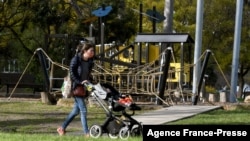Children will be the keynote speakers at a meeting in Australia starting Thursday aimed at reinvigorating outdoor play to help tackle “an epidemic of social isolation and loneliness."
Informal, outdoor play has been declining in Australia.
Academics say Australian parents have become increasingly cautious and worried about the safety and well-being of their children. Experts say there are a range of factors contributing to the decline in outdoor play, including increased traffic, a lack of city planning, greater housing density.
Stay-at-home orders during COVID-19 lockdowns have exacerbated the issue. But parents also fear abductions by strangers, although officials say such incidents are “incredibly rare.” In Western Australia alone, there were 15 kidnapping and “child stealing” incidents reported in the past year, according to official government figures.
The summit is aiming to address such issues with an all-inclusive platform, including children's participation. Nicole Schweir’s 11-year-old daughter is one of the keynote speakers at the Childhood Summit.
Shweir refuses to allow her children to play in the streets outside.
“You hear of kids 11 and younger just being snatched and it’s not that I don’t trust my neighbors. We know our neighbors, great, but I don’t trust my neighborhood anymore and that is a big problem,” she said.
Academics say a lack of outdoor play is robbing children of vital social skills they’ll need as adults. Those attending the childhood summit in Brisbane will hear of the potential physical and mental consequences.
Hyahno Moser, one of the organizers of the conference, said a lack of play is leaving some children dangerously isolated.
“We are seeing the highest rate of youth suicide that we have ever seen. That is largely to do with the fact that children have been disconnected from each other. They have not built up those social skills to cope with social settings, and social isolation and loneliness is such an epidemic. You know, I have heard it earmarked as the next biggest health crisis,” said Moser.
Medium- and high-density housing, which is relatively new in Australia, is presenting new challenges. In Sydney, almost a quarter of households in apartments are families with children. Experts are warning that their needs are not being met. They say developers should put the well-being of children first, with carefully designed parks, playgrounds and safer streets.
They say they believe play is the work of childhood, which creates resilient and healthy adults. The three-day conference brings together children, teachers, architects, urban planners and academics.
The aim it to forge so-called “play action plans” for towns and cities across Australia, and beyond.




